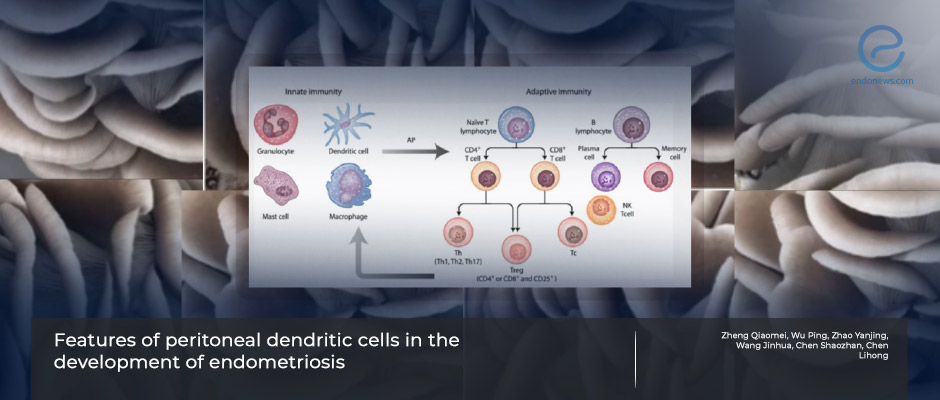Role of peritoneal dendritic cells in endometriosis development
Aug 15, 2023
New study reveals dendritic cell changes linked to endometriosis
Key Points
Highlights:
- The increased level of peritoneal dendritic cells facilitates the development of endometriosis lesions, especially in the early stages of the disease.
- New findings provide new insights into the understanding and potential treatment of endometriosis.
Importance:
- Dendritic cells are crucial immune cells that bridge innate and adaptive immunity, playing a significant role in immune response modulation.
- Alterations in this population is linked to autoimmune diseases and have been observed in endometriosis.
What is done here:
- This study investigates the role of peritoneal dendritic cell maturation on endometriosis development.
- The study involved 12 endometriosis patients 11 controls and a murine model of endometriosis.
- Peritoneal dendritic cell subsets were analyzed using flow cytometry, distinguishing between mature (mDCs) and immature (iDCs) DCs based on CD80 and CD1a markers.
- Changes in dendritic cell maturation were examined in both patient samples and the mouse model.
Key results:
- An increased density of peritoneal dendritic cells in women with endometriosis was observed.
- The proportion of mature mDCs in the peritoneum was lower, while the proportion of iDCs was increased in women with endometriosis.
- The cell density of peritoneal DCs increased immediately after the injection of endometrial tissues in the mouse model and reached the highest level at 14 days.
- The proportion of mDCs in the peritoneum decreased immediately after the injection and then increased with time but remained lower than in the control group.
- Injecting lipopolysaccharide to promote dendritic cell maturation resulted in increased mDC proportion and more undersized, lighter endometriosis lesions.
Limitations:
- Small sample size, potentially impacting the generalizability of the findings
- The mechanism of peritoneal DCs maturation in the development of endometriosis still being unclear
Lay Summary
Dendritic cells (DCs), essential antigen-presenting cells bridging innate and adaptive immunity, play a pivotal role in immune response modulation. They capture process, and present antigens, facilitating T-cell activation. DCs also promote self-tolerance by releasing tolerogenic cytokines, contributing to autoimmune disease pathogenesis. In endometriosis, alterations in DC populations have been observed, impacting disease development.
Aiming to examine the impact of peritoneal DC maturation on endometriosis development, Dr. Lihong group from China investigated the altered DC populations in endometriosis patients' endometrium and peritoneal fluid. The results were published in the January 2023 issue of the journal "Reproductive Biology and Endocrinology".
The study involved 12 endometriosis patients, 11 controls, and a murine model of endometriosis. Flow cytometry analyzed peritoneal DC subsets using CD80 and CD1a markers and the peritoneal fluid analysis examined DC maturation changes. A technique called fluorescence-activated cell sorting (FACS) was performed to analyze the count and composition of peritoneal DCs. It was found that in endometriosis patients, the overall density of peritoneal DCs was higher compared to controls. However, the proportion of mature DCs (mDCs) was lower, while the proportion of immature DCs (iDCs) was higher in endometriosis patients.
Using a mouse model, the researchers induced endometriosis by injecting endometrial tissue into the peritoneal cavity, mimicking the disease. They observed that the density of peritoneal DCs increased after the injection, with the highest density at 14 days. The proportion of mDCs decreased initially after injection and then increased gradually but remained lower than in controls. Conversely, the proportion of iDCs showed an opposite pattern.
To examine the role of DC maturation in endometriosis progression, the researchers injected lipopolysaccharide to promote DC maturation. They found that increased maturation of mDCs led to smaller and lighter endometriosis lesions, suggesting a potential therapeutic avenue.
The authors suggest that peritoneal DCs play a role in endometriosis development, with altered proportions of mDCs and iDCs in both patients and mouse models. The dynamic changes in DC proportions over time, especially with induced maturation, point to their involvement in disease progression. This research provides valuable insights into the immune-related mechanisms underlying endometriosis and hints at potential treatments that target DC maturation.
Research Source: https://pubmed.ncbi.nlm.nih.gov/36639763/
endometriosis dendritic cells antigen-presenting cells

